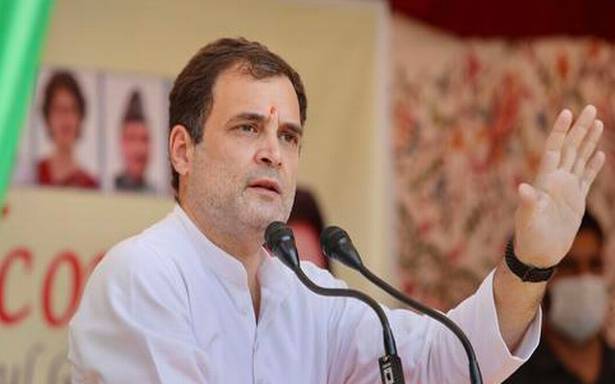Following the Microblogging site’s submission, the court posted the next hearing in the case for September 27.
Microblogging site Twitter on Wednesday, Augut 11, 2021, informed the Delhi High Court that it has removed an offending tweet posted by Congres leader Rahul Gandhi sharing a picture of himself with the parents of 9-year-old alleged rape and murder victim in the capital.
Twitter further said the account of Mr. Gandhi has also been blocked as his August 5 tweet was in breach of its policy.
Following Twitter’s submission, a bench of Chief Justice D.N. Patel and Justice Jyoti Singh posted the hearing on the petition seeking initiation of legal action against Mr. Gandhi for September 27.
During the brief hearing, the bench got miffed at the advocate, appearing for the petitioner Makarand Suresh Mhadlekar, who disputed the submission made by Twitter’s counsel before the court.
"The counsel for respondent number 4 (Twitter) says they have removed (the tweet) even without order from the court. There is no reason to disbelieve it. If this is your attitude, we are not issuing notice. We will see on next date," the bench remarked.
Senior advocate Sajan Poovayya, representing Twitter, said, "We have locked that account and the tweet is no longer available. It violates our policy as well. This is the status as on date".
In his petition, Mr. Mhadlekar, who claims to be a social activist, claimed that Mr. Gandhi posted a photo of himself with the victim’s family members on Twitter on August 5.
This, the plea said, was in violation of Section 74 of the Juvenile Justice Act, 2015 and Section 23(2) of the Protection of Children from Sexual Offences Act (POCSO) 2012, both of which mandate that the identity of a child victim of a crime shall not be disclosed.
A violation of section 74 of the JJ Act is punishable with imprisonment for a term which may extend to six months or fine of ₹ Two lakh or both. A violation of section 23(2) of the POCSO Act is punishable with imprisonment for a period of minimum six months and maximum one year.
Source: Read Full Article

